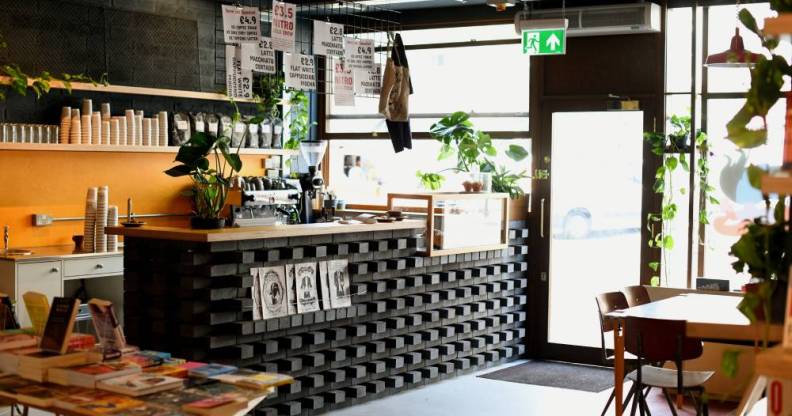Radical new LGBT+ venue includes alcohol-free space so that community doesn’t have to mean drinking

A gorgeous new queer meeting space and bookshop has opened up in London, providing much-needed safe space for sober queer people. (Provided/Kenneth Lam)
A gorgeous new queer venue and bookshop has opened up in London, providing LGBT+ people with a safe space that isn’t alcohol-focused.
Bars and nightclubs have traditionally been places where queer folks can meet, find community and safety. And as a result, alcohol consumption has widely become a normalised part of LGBT+ life.
When identity and community are wrapped up in alcohol-centred spaces, it can be hard for queer people to find a spot where alcohol isn’t the sole focus or even to just have an alternative space to feel comfortable.
Aisha Shaibu, founder and director at Moonlight Experiences, wants to help change that by offering an LGBT+ space in London that isn’t specifically alcohol-focused. She has helped Glass House Projects set up the recently open an LGBT+ multidisciplinary venue called Glass House in Brick Lane, a safe space where the queer community can thrive.
The “beauty” of the space, Aisha told PinkNews, is it provides alternative queer social events for people searching for sober options. But there is also the ability to commune with friends who still want to drink.
The one-of-a-kind venue includes a bookshop and cafe called the Common Press that is packed to the brim with books on trans-inclusive feminism, anti-colonialism, anti-fascism and self-care.
There is also a bar which will open up from 30 September, and an event space for the community to come together.
“I think it’s a really fine balance because what we want to do is have the option,” Aisha explained. “It doesn’t mean we don’t have any alcohol, but it means that it gives you that alternative space.”
View this post on Instagram
People interested in social socials or an alternative social community can find non-alcoholic alternatives in the space, Aisha said. But there is also a restaurant and bar next door where people can drink, but they’re “not allowed to move with that alcohol into the non-alcoholic section”.
“So it means that you’re able to have two alternatives,” Aisha shared. “Be around your friends that love drinking, but then you don’t have to be in the alcoholic space.”
This normalisation of alcohol-focused spaces is not just in the venues themselves but also at drag and performance events. And there can be a huge amount of stigma towards those who don’t drink at such in-person events.
International drag performer and theatre artist Crayola has felt this pressure first hand. She told PinkNews that she has been on an ongoing journey towards understanding her alcohol consumption and its links to her career as an artist.
“I started partying really young, and flash forward to venturing into drag – well, there’s a lot of Venn diagramming with nightlight and clubland,” she explained. “It’s part of the culture.”
She told PinkNews sometimes drag artists just “show up to the gig” and are handed “drink tickets”. Crayola added this can be an especially tricky situation to navigate as a “baby drag artist” who is sometimes given drink tickets instead of proper payment.
“That in itself creates a weird pressure to take advantage of it because that’s essentially your payment,” Crayola said.
She continued: “That’s not even mentioning the fact that you’ve got audience members wanting to buy your drinks in the middle of the show, after the show or even before the show.
“Also, there are a lot of nerves around doing this kind of thing.”
View this post on Instagram
Crayola told PinkNews that she experienced her own struggles with alcohol, and there was a point where she was drinking “three, four or five times a week” because of the pressures of work and “performance anxiety”.
“So there was a time where I was convinced I had to have a drink before a show in order to be funny,” Crayola recalled. “I felt like if I didn’t then my personality wouldn’t show up. It wasn’t a very healthy situation.”
She has gone sober a “couple of times in different ways” and was entirely sober for January, February and half of March last year. Therapy has helped her “reflect over the last year”, and she’s now in the place where she can keep drinking to her “fun time”.
Crayola believes that spaces for queer people where alcohol isn’t the focus are “so crucial” because the LGBT+ community has a “lot of trauma” both “collective” and “personal”.
“There’s a lot of stuff we have to work through,” Crayola said. “It’s nice to have a place where the focus can be on the conversation, the dancing, the reading or whatever the more wholesome activity is rather than just getting blotted out.”

